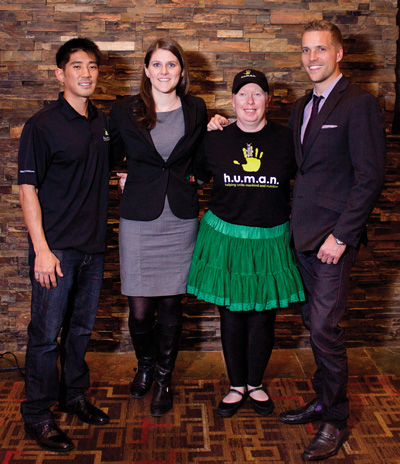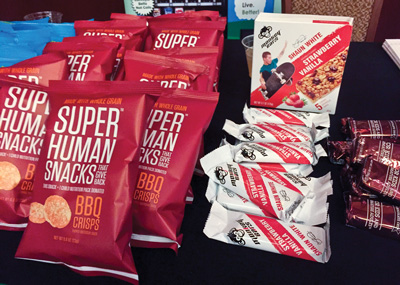News
Healthy Products Take Center Stage At Randolph-Sheppard Vending Confab
March 27, 2015
TAGS: Randolph-Sheppard Vendors of America, HUMAN, Sagebrush vending conference, blind vending operators, educational conference, RSVA healthy vending white paper, Misinformation Shaping Public Policy: Healthy Vending, Katie Bishop, nutrition policy, Center for Science in the Public Interest, Pinky Harris, Sean Kelly |
LAS VEGAS -- The Randolph-Sheppard Vendors of America kicked off its partnership with HUMAN and released its white paper at its annual Sagebrush educational conference, this year at the Golden Nugget Hotel in Las Vegas. Putting operators into the big picture on its healthy vending push were HUMAN chief executive Sean Kelly and Pinky Harris, who authored RSVA's "Misinformation Shaping Public Policy: Healthy Vending and the Randolph-Sheppard Program." Katie Bishop, a nutrition policy associate with Washington-based consumer advocacy group Center for Science in the Public Interest, weighed in with her perspective on healthy vending.
 |
GOING GREEN:RSVA's Pinky Harris, decked out in "healthy" green, and HUMAN chief executive Sean Kelly (right) team up at Sagebrush conference to inform blind vendors about new partnership as option for meeting demand for healthier options on public property. CSPI's Katherine Bishop weighs in on the wellness movement from a public health perspective and HUMAN's Stanton Saiki moderates the discussion. |
One of the studies she cited, which is detailed in the white paper, dealt with a Chicago parks district that implemented a 100% healthy vending policy and reportedly saw sales increase from $84 per machine to $371 during the 15-month study. This, according to Harris, is one of many cases demonstrating the wellness trend and operators' potential for success by implementing a better-for-you program.
"We're not forcing healthy vending, or saying it is going to work in every location," Harris said. "But a lot of us are feeling pressured by GSA [General Services Administration] and HHS [Health and Human Services]. As a vendor, when building managers and public health officials ask what we are doing for healthy vending, where do we go from there? There's no clear-cut path. Our partnership with HUMAN provides a comprehensive option for those vendors that need somewhere to go."
HUMAN provides branded vending machines, and a program package that includes products, training, marketing materials, and assistance with tasting events and promotions. The latter, Harris said, are key to successfully applying the program.
Another benefit of the RSVA-HUMAN partnership, according to Harris, is that the healthy vending promoter does not have franchisees in all areas that request its services. In such cases, RSVA operators will have the opportunity to serve such locations as schools systems and hospitals through HUMAN's partnerships with state licensing agencies.
Some operators at the session questioned the effectiveness of devoting an entire machine to "healthier" choices and the impact of such a move on the bottom line.
HUMAN chief Sean Kelly emphasized that its dedicated "healthy" vending model differs from traditional vending in that what works for one location, population or geographic area does not necessarily work in the same manner for another, even from one side of town to the other. "You need to look at the population at the location and cater to it with everything from equipment and product mix, to promotions and sampling to really make a program work," he said.
He added that dedicated healthy vending requires different practices than the traditional approach, with a heavy emphasis on promoting, marketing, educating and sampling.
The HUMAN chief also acknowledged that some locations by their nature produce higher revenue than others. The ideal environment for a healthy vending machine or micromarket, he said, is one with a white collar clientele that has expressed a genuine desire for "100% healthy" before the installation.
Katie Bishop explained that her role at CSPI is working with states, municipalities and local agencies to ensure access to healthy food and beverages on public property. She also advises on which products to make available and how to encourage people to consume them, alerting operators that the "healthy" movement is in full swing and here to stay.
She discussed a paper she coauthored. "Vending Contradictions: Snack and Beverage Options on Public Property" surveyed options in 800 vending machines across 260 state and local public properties across 37 states. It found that 80% of options were either fried chips, sweet baked goods or candy, and only 5% met what CSPI considers to be healthy. She said beverage menus were "more encouraging" with 58% of the mix being soda or other sugar sweetened drinks, while the rest were "healthier."
"The big takeaway is that we need to be doing better," Bishop said. "States and localities have large obesity and chronic disease prevention programs and give out health information to their citizens and employees to eat more fruit and vegetables and whole grains, and less sugar, sodium and saturated fat, but that's not aligned with choices on public property."
 SUPPLY MEETS DEMAND:Proliferation of better-for-you snacks and drinks on Sagebrush show floor include sampling of HUMAN's offerings. SUPPLY MEETS DEMAND:Proliferation of better-for-you snacks and drinks on Sagebrush show floor include sampling of HUMAN's offerings. |
The public health advocate encouraged operators to work with their state or local health departments by enlisting their help to host taste-tests and promotional events at parks and community centers, and to spread the word through emails and posters.


